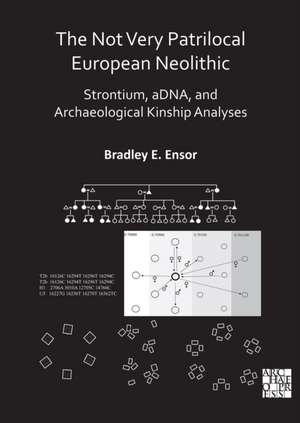The Not Very Patrilocal European Neolithic
Autor Bradley E. Ensoren Limba Engleză Paperback – 30 sep 2021
Preț: 298.66 lei
Nou
Puncte Express: 448
Preț estimativ în valută:
57.16€ • 58.91$ • 48.26£
57.16€ • 58.91$ • 48.26£
Cartea se retipărește
Doresc să fiu notificat când acest titlu va fi disponibil:
Se trimite...
Preluare comenzi: 021 569.72.76
Specificații
ISBN-13: 9781789699807
ISBN-10: 1789699800
Pagini: 252
Ilustrații: 24 figures, 18 tables
Dimensiuni: 246 x 175 x 18 mm
Greutate: 0.67 kg
Editura: ARCHAEOPRESS
ISBN-10: 1789699800
Pagini: 252
Ilustrații: 24 figures, 18 tables
Dimensiuni: 246 x 175 x 18 mm
Greutate: 0.67 kg
Editura: ARCHAEOPRESS
Notă biografică
Bradley E. Ensor (PhD 2003, University of Florida) is a professor of anthropology at Eastern Michigan University (2003-present). He teaches archaeology, social anthropology, and physical anthropology. His research addresses theory and methods in archaeology, bioarchaeology, and ethnology emphasizing the intersections of political economy, kinship, and gender. His publications include Crafting Prehispanic Maya Kinship (2013), The Archaeology of Kinship (2013), Oysters in the Land of Cacao (2020), 17 journal articles, and 7 chapters in edited volumes.
Descriere
Two decades of strontium isotope research on Neolithic European burials - reinforced by high-profile ancient DNA studies - has led to widespread interpretations that these were patrilocal societies, implying significant residential mobility for women. This volume questions that narrative from a social anthropological perspective on kinship.
